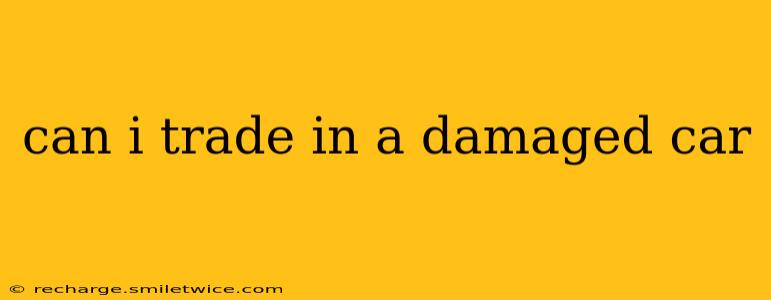Can I Trade in a Damaged Car?
Yes, you can typically trade in a damaged car, but the process and outcome will significantly depend on the extent of the damage and the dealership's policies. While it might seem impossible to trade in a vehicle that's been in an accident or has significant mechanical problems, many dealerships are willing to accept them, although you'll likely receive a lower trade-in value than you would for a car in pristine condition.
This guide will explore the intricacies of trading in a damaged car, covering everything from the types of damage considered and how to maximize your trade-in value to understanding the legal aspects involved.
What Types of Damage Affect Trade-In Value?
The severity and type of damage directly impact the trade-in value of your car. Here's a breakdown:
-
Minor cosmetic damage: Scratches, dents, and minor paint chips usually affect the value less significantly. Dealerships often factor these into their assessment, but the impact is typically minimal.
-
Significant cosmetic damage: Major dents, significant paint damage, or body panel replacements will considerably reduce the trade-in value. The cost of repairs will be factored into the appraisal, lowering the amount you receive.
-
Mechanical damage: Problems with the engine, transmission, or other major components will drastically decrease the value. Dealerships may be hesitant to accept vehicles with substantial mechanical issues as they increase their risk and repair costs.
-
Flood damage: Cars damaged by floods often suffer from hidden issues that can be extremely expensive to repair. Trading in a flood-damaged car is considerably more challenging and may lead to a very low or no trade-in value.
-
Frame damage: Damage to the car's frame is a serious issue, usually rendering the vehicle unsafe. Dealerships are unlikely to accept a car with frame damage due to safety and liability concerns.
How Can I Maximize My Trade-In Value for a Damaged Car?
Even with damage, you can still take steps to improve your trade-in offer:
-
Honest disclosure: Be upfront about the damage to your vehicle. Hiding information will only hurt you in the long run. Providing complete and accurate information fosters trust and improves your chances of a fair offer.
-
Gather repair estimates: Obtain quotes from reputable mechanics detailing the cost of repairs. This provides transparency and can help the dealership assess the car's value more accurately.
-
Shop around: Don't settle for the first offer you receive. Compare offers from multiple dealerships to find the best deal.
-
Clean your car: A clean car presents a more favorable impression. Even with damage, a clean vehicle demonstrates care and can improve your overall negotiation position.
-
Consider selling privately: If you're unhappy with the trade-in offers, consider selling your car privately. This may allow you to obtain a higher price, but it requires more effort and carries the risk of dealing directly with individual buyers.
What Documents Do I Need When Trading in a Damaged Car?
Be prepared to provide the following documents:
- Vehicle title: This proves your ownership of the vehicle.
- Repair estimates (if available): These help the dealership assess the extent of the damage.
- Vehicle history report: This document outlines the vehicle's history, including any accidents or repairs.
What Happens After I Trade in a Damaged Car?
The dealership will typically assess your car's condition and offer a trade-in value. This value will be deducted from the price of the new vehicle you're purchasing. Remember, this is a negotiation, so don't be afraid to counteroffer.
Can I Trade in a Car That's Been Totaled?
Trading in a totaled car is extremely difficult, if not impossible. Insurance companies typically salvage totaled cars, and their value is significantly diminished. Dealerships may not be interested in taking on the liability and potential costs associated with a totaled vehicle.
What if the Dealership Doesn't Want My Damaged Car?
If a dealership refuses to accept your damaged car as a trade-in, consider selling it privately, either through online classifieds or to a salvage yard. You might receive a lower price than you hoped, but it could still be a better option than leaving the car unused and unsellable.
By understanding the process and being prepared, you can successfully trade in your damaged car and move on to your next vehicle. Remember, honesty and transparency are key to a positive outcome.
